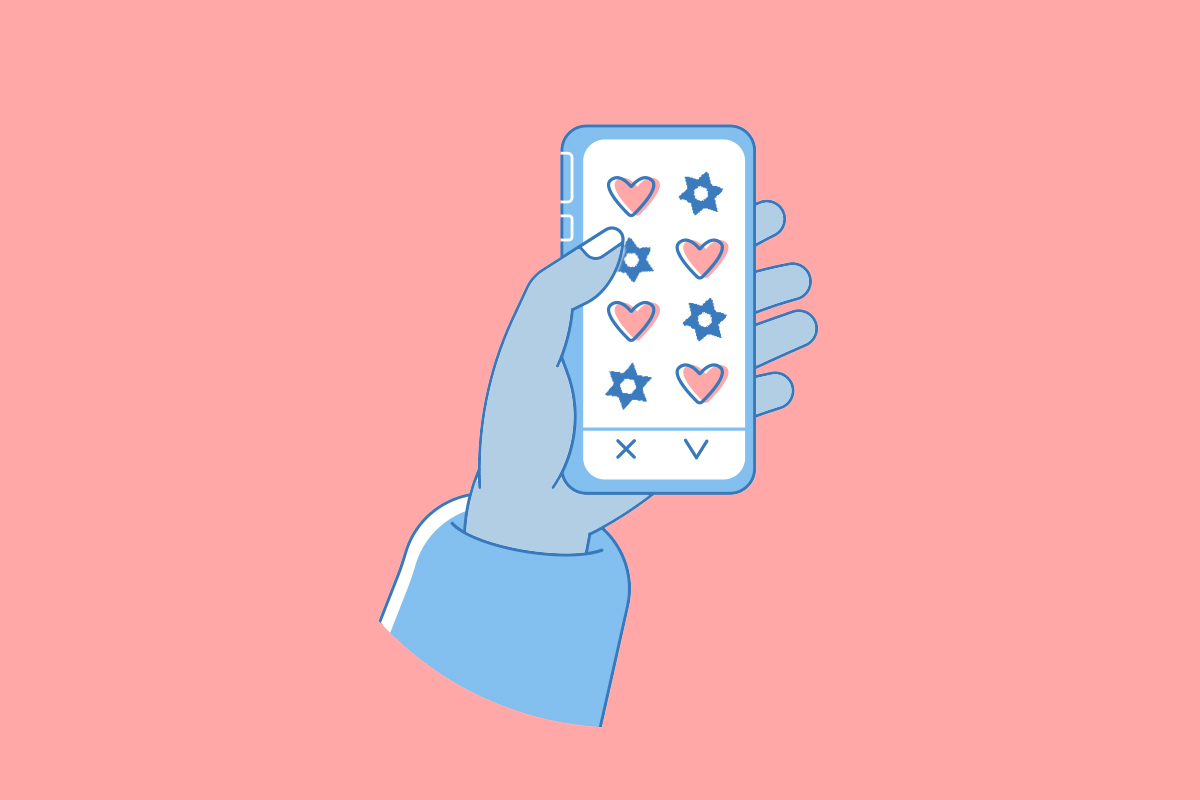If you, like me, are a Jewess with way too much time on your hands in quarantine and a raging Twitter habit, you may have heard about the latest in Jewish dating – the Lox Club. For those who haven’t yet come across it, the Lox Club is a new Jewish dating app that advertises itself as being “for Jews with ridiculously high standards.”
While, on its surface, the framing of the Club as an exclusive hideaway from the legions of fish-wielding gentiles on Tinder may sound enticing, I have to admit that the phrase “ridiculously high standards,” especially in regard to a dating app, activates my fight or flight instinct. It makes me ask the questions of what they consider high standards to be, how they go about determining if a person is “worthy” of being placed among the oh-so-holy profiles on their app (that will inevitably be speedily swiped through anyway), and who makes the call of which applicants make the cut.
I couldn’t help but wonder if, like most things that advertise themselves as being for only a select group of people — and that charge a $12 monthly fee (not an insignificant amount of money!) — the Lox Club would be as classist as I feared. (I also couldn’t help but wonder if writing this article about a dating app makes me Carrie Bradshaw if she was Jewish and knew what an iPhone let alone a dating app is, but that’s a conversation for another time.)
With an open heart and the chutzpah of a truth-seeking Jewess, I decided to give the Lox Club the benefit of the doubt and go through the application process myself. By no means is my opinion the final say on whether or not something is “problematic,” but I think it was worth my while (and hopefully yours too if you’re reading this!) to investigate. I also reached out to the creators of the Lox Club to ask how they determine who meets their high standards, but they declined to comment on the matter.
Alrighty then! Let’s get started.
Upon opening the app, I had to read through a story about a Jewish speakeasy that closed in 1953 that required a password to get into. I then had to enter a password to get into the app which was hinted at in the story. I will say that the idea of a secret Jewish soiree genuinely rules (anyone interested once we’re all vaccinated?) but having to answer that question felt slightly like an SAT reading comprehension test.
The next few questions were pretty standard: name, email, Instagram username, gender, and the genders that I am looking for on the app. Something that was confusing to me about this process was that the list of possible genders I could identify myself as was fairly exhaustive and inclusive, but the options for whom I am looking to meet were only “men,” “women,” and “everyone.” I have no interest in meeting men (especially ones who identify as having “ridiculously high standards”) but would be interested in meeting people who fall outside of the identities of man and woman, and I know many people who feel similarly. I also wonder what the algorithm does with people who identify themselves as an option other than binary genders — who gets to see them once in the Club? Is it only people who have selected that they’re interested in “everyone”? That is not only exclusionary, but robs people of so many connections that they could otherwise potentially make!
I ended up selecting that I am a woman looking for women and moved on.
The next few questions were where the app hinted at taking a turn. It asked about my hometown, where I’m living now, my college, profession, and employer. There is no world in which these questions having an impact on whether you meet “ridiculously high standards” isn’t classist (which is inherently tied up with all other forms of systemic inequality). The ability to go to a “good college” and find a fancy job is often based mostly on a person’s family’s monetary and cultural capital. But I also wasn’t sure what exactly they were doing with this information, or how it would affect my chances of being selected.
I then selected the one (only one!) photo of myself to include (a picture of me at one of the last parties I went to in the Before Times, wearing a sheer gold top that mysteriously disappeared after that night, may she rest in peace) and looking, in my objective, humble opinion, hot.
The next question asks flat out what earlier ones were attempting to get at: “Please provide a brief career history and future ambitions.” It is problematic for the aforementioned reasons of using a person’s career as a determination of their value, but also, who gives the creators of this app the power to decide what career paths are deemed as desirable for people with “high standards”? I made a vow to never again sign up for a dating app that makes you write a cover letter, no matter how desperate my future self might become, jotted down some things about past jobs, and moved on, feeling gross.
Lo and behold, a little over a week later, I received the notification we’ve all been waiting for: “Your Lox Club decision has arrived.” As skeptical as I was, I must admit that my heart did start beating a little faster than usual as I opened it (I can’t help that rejection’s still rejection, even if the criteria are bogus!). Upon tapping the app, it greeted me with a reiteration of its slogan and the fact that “only 20% of applicants are accepted.” I quickly swiped past that and was met with a navy blue screen bearing the coveted words: “Welcome to the Lox Club.”
I didn’t feel the rush of validation that I expected I might after being accepted into something meant for people with “ridiculously high standards.” Maybe it’s because the application didn’t ask anything about the things I actually care about and truly does not reflect who I am aside from the jobs I’ve had and the various amounts of privilege that I hold.
While at this point, I was pretty sure that the Lox Club would not be for me, I was offered a free three-month trial and, like any good Jew, couldn’t pass it up.
I went on to create my profile, but a red flag immediately jumped out: There’s no room to write a bio about yourself, just a section to list your “career and ambitions.” Maybe reading an AEPi member’s embellished story about being the CEO of his own start-up (I had to switch to seeing men on the app because at first it said that there were no women! Another red flag!) is sexy to someone, but that person is not me. This feature pushes people who joined the Lox Club just looking for other Jews (a frequent answer when I asked my matches why they joined) to judge others based on classist criteria.
I’m sure that lots of people who joined the Lox Club didn’t do so because they are classist. Ultimately, the onus is on the creators of the app, rather than the people on it, to create an environment that is welcoming. For me, Lox Club didn’t achieve that.
And so, I am sorry to report that the Lox Club, which had the potential to be a lot of fun, felt just as icky as its slogan made it sound. I don’t need an app to tell me that people with “high standards” want to fuck me, and you shouldn’t either! Go take on the world with the confidence that you are someone’s dream beshert (and maybe stick to Tinder).



